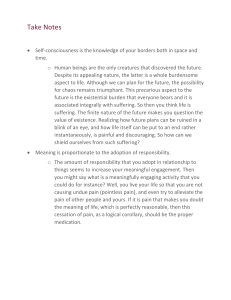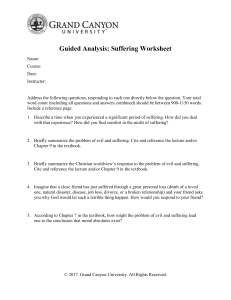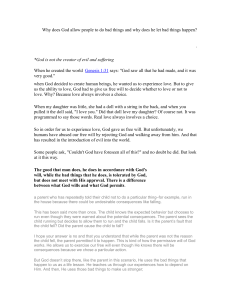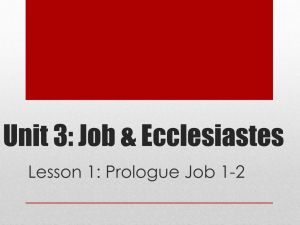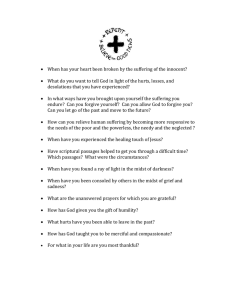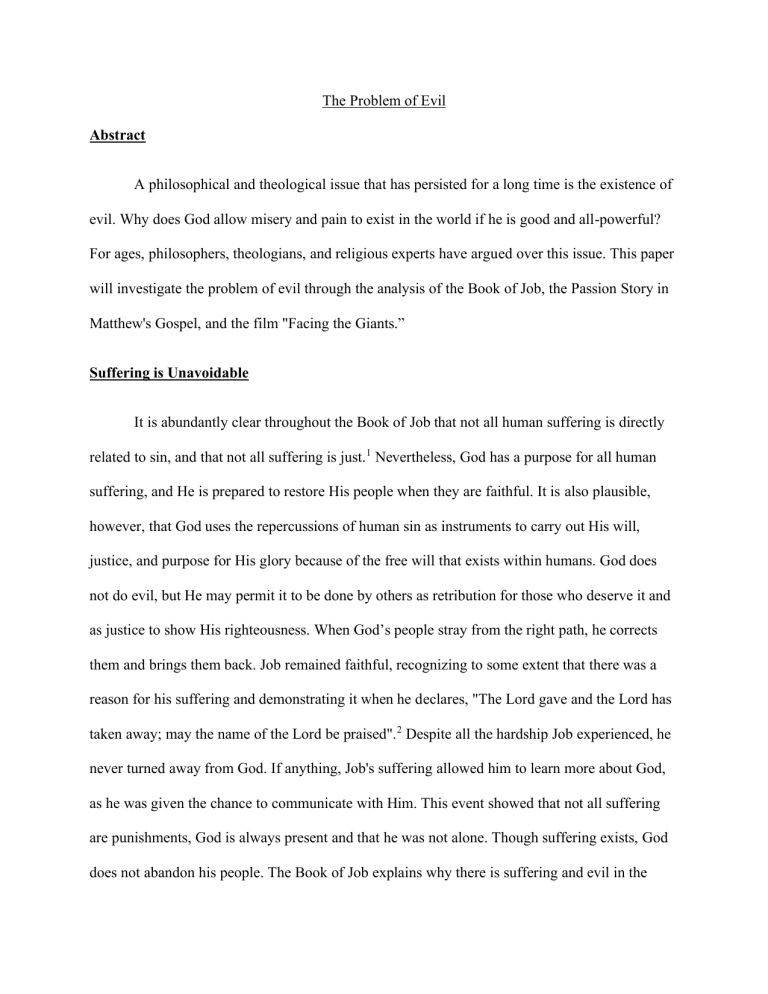
The Problem of Evil Abstract A philosophical and theological issue that has persisted for a long time is the existence of evil. Why does God allow misery and pain to exist in the world if he is good and all-powerful? For ages, philosophers, theologians, and religious experts have argued over this issue. This paper will investigate the problem of evil through the analysis of the Book of Job, the Passion Story in Matthew's Gospel, and the film "Facing the Giants.” Suffering is Unavoidable It is abundantly clear throughout the Book of Job that not all human suffering is directly related to sin, and that not all suffering is just.1 Nevertheless, God has a purpose for all human suffering, and He is prepared to restore His people when they are faithful. It is also plausible, however, that God uses the repercussions of human sin as instruments to carry out His will, justice, and purpose for His glory because of the free will that exists within humans. God does not do evil, but He may permit it to be done by others as retribution for those who deserve it and as justice to show His righteousness. When God’s people stray from the right path, he corrects them and brings them back. Job remained faithful, recognizing to some extent that there was a reason for his suffering and demonstrating it when he declares, "The Lord gave and the Lord has taken away; may the name of the Lord be praised".2 Despite all the hardship Job experienced, he never turned away from God. If anything, Job's suffering allowed him to learn more about God, as he was given the chance to communicate with Him. This event showed that not all suffering are punishments, God is always present and that he was not alone. Though suffering exists, God does not abandon his people. The Book of Job explains why there is suffering and evil in the world and gives purpose to the same suffering. Suffering can also be a result of human sin and free will, which can lead to negative consequences. However, even in the face of suffering, God remains just and loving, and His plan cannot be comprehended by human understanding.3 Free-Will Most of the evil in the world is a result of people's decision to act freely. Many instances of evil behavior can be seen in the film "Facing the Giants," such as when Alvin tries to persuade Brady to take Grant's place as the head coach.4 Grant encounters this on numerous occasions in addition to the many other pains and suffering he is going through at the moment. Despite all these difficulties, he chooses to turn to God for help. The following day, Mr. Bridges shows up, reads a chapter to him, and tells him, “The Lord is not through with you yet, you still have an open door here and until the lord moves you, you are to bloom where you have been planted.” 5 A sign from God that came to provide wisdom to Grant to help guide him forward. Mr. Bridges then shares a story of two farmers who desperately needed rain, both prayed but only one prepared their field.6 In this scenario, if you want to be the one to receive rain, you must truly believe and trust whom you are praying to. From this belief, he was able to turn his life around, bring his team towards victories and even bless their family with a child.7 He was able to accomplish everything that he had previously believed to be impossible because of his free will and his dedication to God. God has granted us free will, and it is up to us to decide whether we will use it to follow the path of the good or the wicked. Good Over Evil Matthew's Gospel Chapters 26-28 focus on the suffering and death of Jesus Christ. Jesus was betrayed by Judas, denied by Peter, and ultimately sentenced to death by Pontius Pilate.8 He endured scorn, beatings, and crucifixion. Jesus experienced not only physical but also psychological and spiritual agony. "My God, my God, why have you forsaken me?" he wailed to God.9 However, Jesus' suffering had a purpose. He showed his love for people through his suffering and carried out the Old Testament prophecies. He also atoned for mankind's sins and provided a way for people to have a right relationship with God. For humanity to be saved, Jesus had to endure the agony. Important questions about the nature of evil and the attributes of God are raised by The Passion Story. It implies that good is not only present when evil does not, but that it is a positive force that resists God's will. Jesus' suffering serves as a reminder of God's love for people rather than serving as a penalty for sin. Jesus accepts the world's sins voluntarily and bears the consequences. The story doesn't end with Jesus' suffering. On the third day, he is raised from the grave, showing that God has power over both evil and death. 10 For anybody who is suffering, the resurrection serves as a sign of hope and a reminder that good always triumphs over evil. Conclusion Even for those who believe in a good and all-powerful God, the question of pain and suffering continues to be challenging topic. The perspectives provided by the Book of Job, the Passion Story in Matthew's Gospel, and the motion picture "Facing the Giants" provide several angles on this matter. The Book of Job emphasizes that suffering is a part of the human condition and that God’s ways are not always understandable. The Passion Story offers the hope of redemption and renewal through God’s power, demonstrated in the resurrection. The theme of "Facing the Giants" is endurance and trust in the face of adversity. Together, these viewpoints provide a intricate answer to the issue of pain and suffering. End Notes 1 (Job 1:1) (Job 1:21) 3 (Job 38:2) 4 (“Facing the Giants”, 2006, 37 minutes 20 seconds) 5 (“Facing the Giants”, 2006, 39 minutes 10 seconds) 6 (“Facing the Giants”, 2006, 40 minutes) 7 (“Facing the Giants”, 2006, 1 hour 43 minutes 27 seconds) 8 (Matthew 26-27) 9 (Matthew 27:46) 10 (Matthew 28:5) 2
